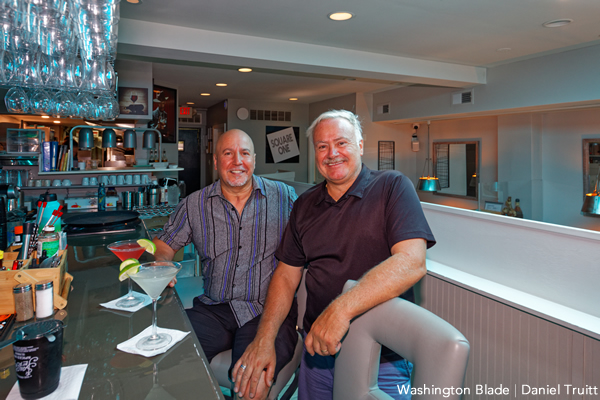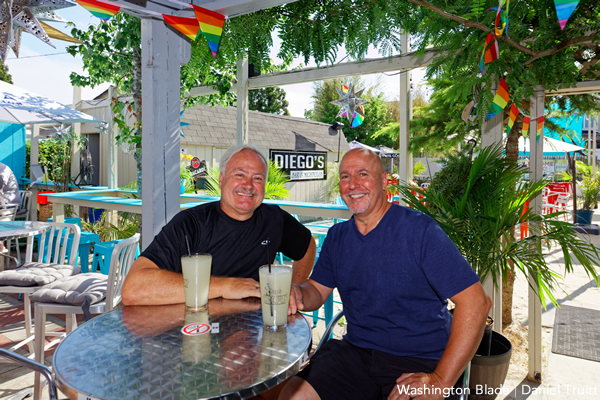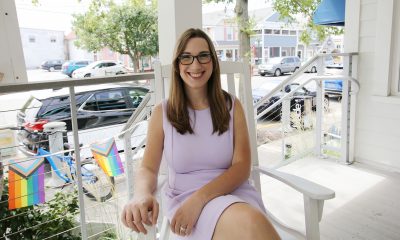Local
A year after surviving COVID, business is flourishing
Darryl and Joe Ciarlante-Zuber on facing death — and the birth of Rehoboth’s Square One

Last year, Darryl Ciarlante-Zuber nearly died from the novel coronavirus while his husband, Joe, sat in quarantine.
After 40 days of intensive care at Beebe Medical Foundation and a year of support from their friends and the community, the duo have since opened a second restaurant and are thriving.
Joe, who was in Mexico, received a call on March 28, 2020, from his husband complaining that he was having difficulty breathing. After instructions from his doctor, Darryl packed for a supposed three-night stay at the emergency room.
“It was like [my doctor] really wants me to go to the ER, and I don’t really feel that sick,” Darryl said. “I said, ‘I’m just out of breath, up and down steps, but other than that, I really didn’t feel sick.’”
Three nights turned into a call from clergy, asking Joe if Darryl would like some prayers. The second call Joe received was from a doctor in the ICU.
“They said Darryl has 30 minutes to live and is severely ill,” Joe said. “[They said] his lungs are nearly totally collapsed and filled with stuff, and we want to put him on a ventilator.”
Joe’s impromptu and urgent flight from Mexico back to Rehoboth was filled with anxiety, especially since not much was known about the coronavirus that early in the pandemic.
“Is he going to be alive? Is he going to be dead? It’s COVID, what is this COVID thing?” Joe said. “I was on a plane, and I was one of the only ones with a mask. The reason I had a mask is because my friend who drove me to the airport had a mask from his maid and said, ‘Here, use this.’ It was a whirlwind experience.”
Darryl spent 23 days on life support, while the recommended time for a ventilator is a maximum of six days.
“The doctors told [Joe], ‘We just don’t know how he’s going to come out,’” Darryl said. “But at the time, the doctor said, ‘Well, that seems like it’s the only solution at this point.’ So he pushed it for Joe until the 23rd day.”
Prolonged time on a ventilator can prove dangerous, Joe said, as he was warned about potential negative effects on Darryl’s brain.
“They routinely told me that he would have brain damage and he may or may not be the same person that I knew,” Joe said. “And I said, ‘I’m OK with that.’ When I took my vows, we said that we would be partners forever, husbands forever. If he has brain damage, I’m the one that’s going to deal with it, nobody else.”
Darryl was the third patient in the Beebe ICU to be diagnosed with COVID-19. While in the ICU, Darryl’s white blood cell count fell to only nine, according to Joe.
“They basically said to me, ‘Look, it’s been 20-some days. There’s no recovery, you need to let it go,’” Joe said. “And by some goofy chance, his [white blood cell] numbers jumped from 12 to 25,000, and they went up to 50,000. They have to be 80,000 to take the trach out, and Monday morning, they were at 83,000.”
Darryl said he does not remember much after being led into the ICU from the hospital waiting room.
“I had Joe on FaceTime the whole time just to make sure I was getting there OK,” Darryl said. “I was like, ‘OK, they’re probably going to take me in soon, I’m going to probably lose reception in the hospital and I can’t call but I’ll call you when I can.’ And I just remember hanging up. They took me out of [the entrance] and that’s all I remember after that.”
After 23 up-and-down days on life support, Joe said the Beebe team members spent 40 days dedicated to Darryl’s treatment and that he was constantly given updates, since quarantine protocols were in effect.
“Darryl’s nurses in the ICU were my link to being with him when I couldn’t actually visit,” Joe wrote in a Feb. 9, 2021 essay for the Cape Gazette. “They would assure me that he could hear my voice, even though he made no response. They would tell me that sometimes Darryl would move his feet in reaction to certain things I said to him.”
While Darryl received treatment, Joe updated family and friends through Facebook.
“If I didn’t post something by 11 in the morning, people were calling, ‘What’s happened, how come? Is everything OK?’” Joe said. “Sometimes you just didn’t hear and I didn’t have any information from the doctors or the nurse, they were full, and they had these patients.”
Darryl’s 40 days of treatment finished with physical therapy and rehab.
“I had no movement, I had to relearn walking,” Darryl said. “I had lost all my strength in my arms and so the first two weeks was to try to get me, at least somewhat capable, to move forward to the rehab center.”
Darryl also said that Joe kept a lot of information from him so as not to worry him or worsen his condition, including the severity of the coronavirus in the United States.
“One of the things he had asked me when he was in the hospital, he said, ‘Why aren’t you working?’ and I said, ‘Darryl, everything’s closed,’ and he looked very confused,” Joe said. “You know Nicola Pizza? They never close, never. I said to Darryl, ‘Nicola’s is closed, because of the pandemic.’ He said, ‘Nicola’s is closed?’ [Darryl] got really sad in his eyes and he said, ‘It’s bad, isn’t it?’ So I said, ‘But everything’s getting better, so don’t worry about it, just get yourself better.’”
Darryl and Joe opened Diego’s Bar & Nightclub in 2018, the name a nod to Darryl’s nickname. The bar closed in 2020 like all other businesses due to the pandemic, however the duo did not let Darryl’s condition or the lockdown procedures keep them down.
“Some of the positives about Diego’s is, we were able to create a beach. We took over some of the parking lot and created a beach atmosphere, tables and chairs and umbrellas and transporting nine tons of sand, and socially distanced all the tables,” Joe said. “It really made a lot of the customers feel even more safe, especially being outside.”
Darryl was unable to return to his typical work day, as pinched nerves were causing pain from standing for too long.
“That’s kind of an emotional thing, because you’re used to doing something then all of a sudden, you can’t,” Joe said. “Everybody looks at him and says to him, ‘You shouldn’t be here,’ and he says, ‘I know,’ and they said, ‘Your charts, you are truly a miracle.’”
Before the pandemic, Joe and Darryl made several attempts to open a new restaurant location. In February 2021, the timing worked out and the two opened Square One Grill.
“Fortunately, we found our head chef in December and we just talked about opening up by the end of January, to get it in time for President’s Day weekend,” Darryl said.
Square One general manager Trish Carlin said the restaurant began with experimental takeout dishes for the community, since lockdown efforts kept indoor seating to 50 percent capacity and the team decided to keep the dining room closed.
“[Darryl and Joe] just reached out to so many people that they knew and they set up [takeout] for a group of days, where people could order food and pick it up for free,” Carlin said. “They would want comments on it, how did this work? What did you think about that? They got a lot of feedback.”
Diego’s dance floor opened in late May and the dining room in Square One is also open for customers. Darryl, Joe and Carlin all discussed the community’s positive efforts and support in keeping the businesses alive.
“I felt like the community was waiting for Joe and Darryl to finally be able to do this. And maybe that was part of their motivation,” Carlin said. “I was never worried, honestly, that it wouldn’t work, because it’s them. I think the community really backs them. They really, really love Joe and Darryl and they follow them wherever they go. They want them to be successful and it’s a wonderful thing to see.”

District of Columbia
Bowser budget proposal calls for $5.25 million for 2025 World Pride
AIDS office among agencies facing cuts due to revenue shortfall

D.C. Mayor Muriel Bowser’s proposed fiscal year 2025 budget includes a request for $5.25 million in funding to support the June 2025 World Pride celebration, which D.C. will host, and which is expected to bring three million or more visitors to the city.
The mayor’s proposed budget, which she presented to the D.C. Council for approval earlier this month, also calls for a 7.6 percent increase in funding for the Mayor’s Office of LGBTQ Affairs, which amounts to an increase of $132,000 and would bring the office’s total funding to $1.7 million. The office, among other things, provides grants to local organizations that provide services to the LGBTQ community.
Among the other LGBTQ-related funding requests in the mayor’s proposed budget is a call to continue the annual funding of $600,000 to provide workforce development services for transgender and gender non-conforming city residents “experiencing homelessness and housing instability.” The budget proposal also calls for a separate allocation of $600,000 in new funding to support a new Advanced Technical Center at the Whitman-Walker Health’s Max Robinson Center in Ward 8.
Among the city agencies facing funding cuts under the mayor’s proposed budget is the HIV/AIDS, Hepatitis, Sexually Transmitted Disease, and Tuberculosis Administration, known as HAHSTA, which is an arm of the D.C. Department of Health. LGBTQ and AIDS activists have said HAHSTA plays an important role in the city’s HIV prevention and support services. Observers familiar with the agency have said it recently lost federal funding, which the city would have to decide whether to replace.
“We weren’t able to cover the loss of federal funds for HAHSTA with local funds,” Japer Bowles, director of the Mayor’s Office of LGBTQ Affairs, told the Washington Blade. “But we are working with partners to identify resources to fill those funding gaps,” Bowles said.
The total proposed budget of $21 billion that Bowser submitted to the D.C. Council includes about $500 million in proposed cuts in various city programs that the mayor said was needed to offset a projected $700 million loss in revenue due, among other things, to an end in pandemic era federal funding and commercial office vacancies also brought about by the post pandemic commercial property and office changes.
Bowser’s budget proposal also includes some tax increases limited to sales and business-related taxes, including an additional fee on hotel bookings to offset the expected revenue losses. The mayor said she chose not to propose an increase in income tax or property taxes.
Earlier this year, the D.C. LGBTQ+ Budget Coalition, which consists of several local LGBTQ advocacy organizations, submitted its own fiscal year 2025 budget proposal to both Bowser and the D.C. Council. In a 14-page letter the coalition outlined in detail a wide range of funding proposals, including housing support for LGBTQ youth and LGBTQ seniors; support for LGBTQ youth homeless services; workforce and employment services for transgender and gender non-conforming residents; and harm reduction centers to address the rise in drug overdose deaths.
Another one of the coalition’s proposals is $1.5 million in city funding for the completion of the D.C. Center for the LGBTQ Community’s new building, a former warehouse building in the city’s Shaw neighborhood that is undergoing a build out and renovation to accommodate the LGBTQ Center’s plans to move in later this year. The coalition’s budget proposal also calls for an additional $300,000 in “recurring” city funding for the LGBTQ Center in subsequent years “to support ongoing operational costs and programmatic initiatives.”
Bowles noted that Bowser authorized and approved a $1 million grant for the LGBTQ Center’s new building last year but was unable to provide additional funding requested by the budget coalition for the LGBTQ Center for fiscal year 2025.
“We’re still in this with them,” Bowles said. “We’re still looking and working with them to identify funding.”
The total amount of funding that the LGBTQ+ Budget Coalition listed in its letter to the mayor and Council associated with its requests for specific LGBTQ programs comes to $43.1 million.
Heidi Ellis, who serves as coordinator of the coalition, said the coalition succeeded in getting some of its proposals included in the mayor’s budget but couldn’t immediately provide specific amounts.
“There are a couple of areas I would argue we had wins,” Ellis told the Blade. “We were able to maintain funding across different housing services, specifically around youth services that affect folks like SMYAL and Wanda Alston.” She was referring to the LGBTQ youth services group SMYAL and the LGBTQ organization Wanda Alston Foundation, which provides housing for homeless LGBTQ youth.
“We were also able to secure funding for the transgender, gender non-conforming workforce program,” she said. “We also had funding for migrant services that we’ve been advocating for and some wins on language access,” said Ellis, referring to programs assisting LGBTQ people and others who are immigrants and aren’t fluent in speaking English.
Ellis said that although the coalition’s letter sent to the mayor and Council had funding proposals that totaled $43.1 million, she said the coalition used those numbers as examples for programs and policies that it believes would be highly beneficial to those in the LGBTQ community in need.
“I would say to distill it down to just we ask for $43 million or whatever, that’s not an accurate picture of what we’re asking for,” she said. “We’re asking for major investments around a few areas – housing, healthcare, language access. And for capital investments to make sure the D.C. Center can open,” she said. “It’s not like a narrative about the dollar amounts. It’s more like where we’re trying to go.”
The Blade couldn’t’ immediately determine how much of the coalition’s funding proposals are included in the Bowser budget. The mayor’s press secretary, Daniel Gleick, told the Blade in an email that those funding levels may not have been determined by city agencies.
“As for specific funding levels for programs that may impact the LGBTQ community, such as individual health programs through the Department of Health, it is too soon in the budget process to determine potential adjustments on individual programs run though city agencies,” Gleick said.
But Bowles said several of the programs funded in the mayor’s budget proposal that are not LGBTQ specific will be supportive of LGBTQ programs. Among them, he said, is the budget’s proposal for an increase of $350,000 in funding for senior villages operated by local nonprofit organizations that help support seniors. Asked if that type of program could help LGBTQ seniors, Bowles said, “Absolutely – that’s definitely a vehicle for LGBTQ senior services.”
He said among the programs the increased funding for the mayor’s LGBTQ Affairs office will support is its ongoing cultural competency training for D.C. government employees. He said he and other office staff members conduct the trainings about LGBTQ-related issues at city departments and agencies.
Bowser herself suggested during an April 19 press conference that local businesses, including LGBTQ businesses and organizations, could benefit from a newly launched city “Pop-Up Permit Program” that greatly shortens the time it takes to open a business in vacant storefront buildings in the downtown area.
Bowser and Nina Albert, D.C. Deputy Mayor for Planning and Economic Development, suggested the new expedited city program for approving permits to open shops and small businesses in vacant storefront spaces could come into play next year when D.C. hosts World Pride, one of the word’s largest LGBTQ events.
“While we know that all special events are important, there is an especially big one coming to Washington, D.C. next year,” Bowser said at the press conference. “And to that point, we proposed a $5.25 million investment to support World Pride 2025,” she said, adding, “It’s going to be pretty great. And so, we’re already thinking about how we can include D.C. entrepreneurs, how we’re going to include artists, how we’re going to celebrate across all eight wards of our city as well,” she said.
Among those attending the press conference were officials of D.C.’s Capital Pride Alliance, which will play a lead role in organizing World Pride 2025 events.
Maryland
Health care for Marylanders with HIV is facing huge cuts this summer
Providers poised to lose three-quarters of funding

BY MEREDITH COHN | By the end of June, health care providers in Maryland will lose nearly three-quarters of the funding they use to find and treat thousands of people with HIV.
Advocates and providers say they had been warned there would be less money by the Maryland Department of Health, but were stunned at the size of the drop — from about $17.9 million this fiscal year to $5.3 million the next. The deep cuts are less than three months away.
The rest of this article can be read on the Baltimore Banner’s website.
District of Columbia
Taste of Point returns at critical time for queer students
BIPOC scholar to speak at Room & Board event on May 2

The Point Foundation will kick off May with its annual Taste of Point DC event. The event will be hosted at Room & Board on 14th Street and feature a silent auction, food tastings, a speech from a scholar, and more.
Point’s chief of staff, Kevin Wright, said that at Taste of Point, the scholars are the star of the show.
“People never come to an event to hear Point staff speak, they come to hear from the people most impacted by the program,” he said. “At its core Taste of Point is designed to center and highlight our scholars’ voices and experiences.”
This year, a Point BIPOC Scholar, Katherine Guerrero Rivera will speak at the event.
“It is a great opportunity to highlight the scholars out there on the front lines making impacts in almost every sector and job field,” Wright said.
Wright pointed out that this year especially is a pivotal time for LGBTQ students.
“In 2023, there were 20 states that passed anti-LGBTQ legislation,” he said. “By this point in [2024] we already have more.”
Wright said the impacts of those legislative attacks are far reaching and that Point is continuously monitoring the impact they have on students on the ground.
Last month, The Washington Post reported that states with anti-LGBTQ laws in place saw school hate crimes quadruple. This report came a month after a non-binary student, Nex Bennedict, died after being attacked at school.
“So, we see this as a critical moment to really step up and help students who are facing these challenges on their campus,” Wright said. “Our mission is to continue to empower our scholars to achieve their full academic and leadership potential.”
This year Point awarded nearly 600 LGBTQ students with scholarships. These include the flagship scholarship, community college scholarship and the BIPOC scholarship. When the foundation started in 2002, there were only eight scholarships awarded.
Dr. Harjant Gill is one of those scholars who said the scholarship was pivotal for him. Gill said he spent his undergraduate years creating films and doing activism for the LGBTQ community.
As a result, his academic record wasn’t stellar and although he was admitted into American University’s graduate program he had no clue how he would fund it.
Upon arrival to American he was told to apply for a Point scholarship and the rest was history.
“It ended up being the one thing that kept me going otherwise I would have dropped out,” he said. “Point was incredibly instrumental in my journey to becoming an academic and a professor.”
More than a decade later, Gill serves on the host committee for Taste of Point and is a mentor to young Point scholars. He said that he donates money yearly to Point and that when he is asked what he wants for a gift he will often tell his friends to donate too.
To attend the event on Wednesday, May 2, purchase tickets at the Point website. If you can’t attend this year’s Taste of Point DC event but would like to get involved, you can also donate online.




















